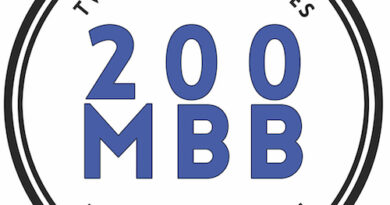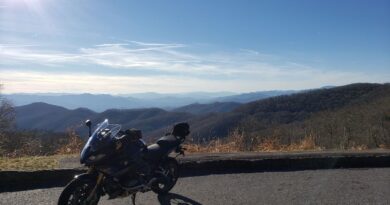The joy of streamlining
As I prepared for a week-long trip to the 2022 National Rally in Springfield, Missouri, I struggled with my life-long tendency to over-pack any time I leave home. If I can imagine I might need something, I feel compelled to take it with me—and I have an incredibly active imagination. After collecting an absurd amount of prospective cargo, I must then pare down the lot, prioritizing what I’ll probably need over what I might possibly need. Another round of thinning is subsequently required to reduce that amount to what will actually fit in my luggage, forcing me to select only what I’ll most likely use and eliminate any overlap/redundancy. Much obsessing occurs throughout this process, revealing my anxiety about the uncertainties involved and the risk of being stranded with inadequate resources. You don’t have to be a psychologist to infer this has roots in a childhood rife with just such predicaments. The details aren’t relevant here, but they left a lasting impression, despite my awareness I’m irrationally applying concerns from the past onto significantly different situations in the present.
 I occasionally toured by motorcycle before the 2022 rally, but it had been many years since I took off for more than a weekend on two wheels. I pondered how to best utilize the luggage system on my current bike and got advice from veteran tourers about what is truly necessary, versus what might just be nice to have onboard. I wrote two essays about this learning process: Light Makes Right (pre-trip) and Lighter Makes Righter (post-trip), with the latter including insights from my rally travel. Since then, I’ve completed a far more ambitious two-week European tour with IMTBike (see Trip of a Lifetime). While that adventure featured the luxury of a chase van to haul stuff we didn’t need to carry on our bikes, I still had to pack very judiciously to tote all my riding gear across the Atlantic, and I had to do additional guesswork regarding what I really must have with me in terra incognita. My higher anxiety about this tour prompted even more obsessive list-making and numerous dry runs, packing and re-packing in various configurations to see exactly what could fit in every nook and cranny while whittling down the total to meet volume and weight limits imposed by the airline.
I occasionally toured by motorcycle before the 2022 rally, but it had been many years since I took off for more than a weekend on two wheels. I pondered how to best utilize the luggage system on my current bike and got advice from veteran tourers about what is truly necessary, versus what might just be nice to have onboard. I wrote two essays about this learning process: Light Makes Right (pre-trip) and Lighter Makes Righter (post-trip), with the latter including insights from my rally travel. Since then, I’ve completed a far more ambitious two-week European tour with IMTBike (see Trip of a Lifetime). While that adventure featured the luxury of a chase van to haul stuff we didn’t need to carry on our bikes, I still had to pack very judiciously to tote all my riding gear across the Atlantic, and I had to do additional guesswork regarding what I really must have with me in terra incognita. My higher anxiety about this tour prompted even more obsessive list-making and numerous dry runs, packing and re-packing in various configurations to see exactly what could fit in every nook and cranny while whittling down the total to meet volume and weight limits imposed by the airline.
In preparation for this year’s National Rally outside Richmond, Virginia (The 50th!), I’ve reviewed the packing lists developed for my last two excursions. Wow—I’m a quite different person! Ideally, we learn from our experiences and become more effective and efficient going forward. Unfortunately, this doesn’t always happen in the case of deep-seated insecurities, which can persist stubbornly in spite of accumulating evidence of their obsolescence. I feel virtually no anxiety whatsoever about packing for my upcoming travel. With only two recent motorcycle trips under my belt (and I realize they were small-scale compared to what real touring riders do), I feel reasonably confident and well-oriented to the task. Those countless hours spent ruminating, reorganizing, and refining my packing plans look crazy from my current vantage point. This is partly a realistic assessment performed by a mind less warped by worry. It’s also a matter of hindsight being 20-20. Without adequate experiential reference points from real-world engagement, we’re all left to speculate based on old data that may or may not accurately predict upcoming situations. We interpolate and extrapolate the best we can, but it’s impossible to feel sure of our conclusions, and our calculations are apt to be unduly influenced by emotional concerns. I certainly trusted the advice of experienced tourers to pack half what I initially planned to take with me, but I didn’t know which half! Now I do, and not because of someone else’s words, but because I’ve been there, done that. All that mental work certainly included some overkill, but it was part of my education, as was the process of trial and error.

Aside from making trip readiness much easier to achieve and far less fraught with apprehension, my new clarity on such matters may benefit other domains. There’s a distinct pleasure associated with streamlining; it’s the inverse of the good feeling I chased by including everything I could possibly fit into my luggage. Instead of taking comfort in the wealth of supplies I carried with me, I now feel exuberantly liberated by an unencumbered, minimalist approach—something I could transfer to my horribly overstuffed garage and workshop, for starters. What if I didn’t have to perform a Rubik’s Cube-like reconfiguration of the myriad items cluttering my shelves and cabinets every time I needed a tool or some supply? Before, I felt compelled to pack several variations of certain things, each optimized for slightly different possibilities. Now I find it far more satisfying to pack the one version that works adequately well across all those scenarios, even though it may not be the absolute best in any one of them. My criterion for contentment has changed. Couldn’t this new perspective be applied to the tools, gear, spares, accessories, and all the other stuff crowding my moto-cave?
I know I’ve previously made the case in this column for holding on to all sorts of scraps, parts, and other sundries, reveling in the delicious vindication that comes when some unlikely piece proves uncannily useful at a feverish moment in an eleventh-hour mechanical project. Of course, such justifications are not only rare, they also don’t consider the outsized costs in terms of space, effort and consternation that come with storing tons of junk, the vast majority of which will never earn its keep. There’s an irrefutably strong argument for dumping all that excess. I’d have more room to work, the things I retain would be easier to find and retrieve, and I wouldn’t feel dismayed and apprehensive about the endless accumulation of “treasure” each time I notice its ever-increasing encroachment.
Yes, I’ll have to run to the store once in a while to buy something I might have otherwise had on hand. Those expenditures of time and money, however, will pale in comparison to the many hours I’ve spent on fruitless searches through my piles of inventory. Even if I do have the thing I need somewhere, it doesn’t matter if I can’t find it—and, even if I can find it, it would have often been much quicker to repurchase it. The additional money spent would have been more than offset by the time saved. The momentary ecstasy that has accompanied finally finding a use for something saved decades ago could be exchanged for the continuous enjoyment of inhabiting an uncluttered, well-organized, fully functional workspace.
My ability to imagine something might be useful has been too influential in my general decision-making, not just packing. I’m not a clinically pathological hoarder, but I do have a bit of that mindset in me. I’ve worked with folks who suffer from real-deal compulsive hoarding, and I can sympathize with their resistance to letting go of stuff their imaginations imbue with value (even when they can make logical arguments to the contrary). I’ve also worked with people whose compulsivity propelled them in the opposite direction, jettisoning anything and everything that lacked immediate, continuous utility, and creating a different set of problems and regrets. Oddly enough, it feels like I might flip some internal switch and become as obsessively austere in what I hang onto as I’ve been excessively inclusive. Clearly, the goal is moderation, but the opposite extreme has its appeal.

My two recent motorcycle trips have been very instructive, but I’m still a touring neophyte. As I do more, I’ll hone my packing skills based on what does and doesn’t prove worth its space in a broader range of situations. Obviously, travel can involve big surprises, but I remain limited by the small capacity of bike luggage and will have to prioritize based mainly on sheer probability of use (and, to some extent, the stakes involved in an omission). While there will always be some possibility I’ll lack some useful item amidst an unforeseen challenge, the risk of that will shrink, even as my packing list does the same.
Being adequately prepared for challenges in the garage seems harder to gauge, since new projects can bear little or no resemblance to any I’ve done before. I’ve had more surprises during disassembly than I’ve ever encountered riding. There’s also vastly more storage space available at home, so it’s tempting to keep filling each larger house to the brim with surplus that must then be transported to the next. On the other hand, it’s much easier to remedy any deficiency at home with a run to the store than it would be to deal with a similar need on the road, and I can apply a simple time-based rubric. If I were to just toss everything that hasn’t proven useful in the past ten years, I might free up 40% of my storage—a thrilling prospect!
The lessons of riding have much to teach us about the rest of our lives if we merely pay attention. Why stop with my saddlebags, top-case, and tank bag when I can reduce my burdensome over-inclusiveness elsewhere, too? Sometimes we take a spark of enthusiasm from one area and use it to light a fire in another. The excitement I now feel about packing light inspires me to pursue a larger version of the same happiness by shedding the excess that has weighed me down as a home mechanic forever. Old fears can drive current thinking and behavior, but new joys can do so, too.
Mark Barnes is a clinical psychologist and motojournalist. To read more of his writings, check out his book Why We Ride: A Psychologist Explains the Motorcyclist’s Mind and the Love Affair Between Rider, Bike and Road, currently available in paperback through Amazon and other retailers.



